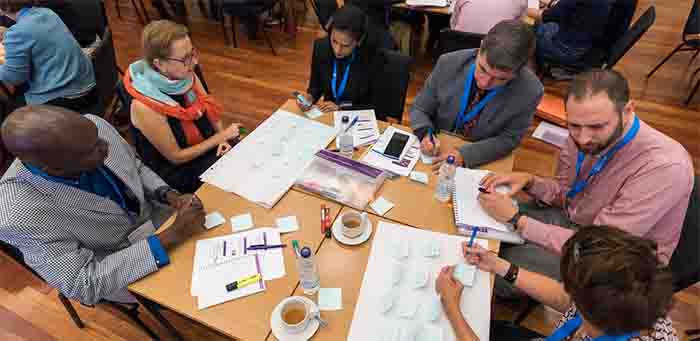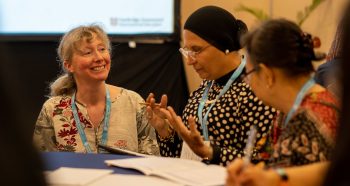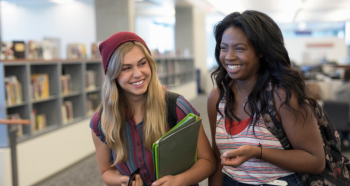In recent years there has been greater emphasis on the use of educational research to inform policy as well as classroom practice. One challenge for teachers is that some academic work is not that accessible or freely available, making it hard to know where to start. In working with teachers at all stages of their careers over the years, I have found that one of the most important and valuable things to do is to get them talking to each other about what they do and why as well as considering what they might do and why. This is where discussing research can help.
If you went to the Cambridge Schools Conference in Cambridge, you’ll know that the discussion with others between sessions can be as valuable as the more formal parts of the day. Below are two quick and easy ways to start to engage with research either alone or with colleagues.
Summaries and compilations
There are a number of high-quality summaries and compilations of research that make a great starting point. There is always a danger when these summaries are compiled that some of the detail and nuance of the original work is lost. However, the original references are often listed so you can follow ideas up if you wish. Here are four good start points.
- Best Evidence Encyclopedia: Based at the Johns Hopkins University, providing summaries of scientific reviews as well as links to the original sources.
- Working with the team behind the Best Evidence Encyclopedia (above) and based in the UK at the University of York, the Best Evidence in Brief Newsletter is an email list that provides short summaries of recent research across all aspects of education.
- What Works Clearinghouse: Another US site providing research reviews. The best places to start on their site are the Practice Guides, which make direct recommendations and their Intervention Reports, which summarise the findings of various interventions.
- If you want more, a blog post from Professor Rob Coe at the University of Durham makes some suggestions about where to go.
Book Club / Reading Group
Reading on one’s own is fine but there can be significant value in getting teachers to talk to each other. A book club or reading group is one way to do this. Here are some suggestions about how to start one.
- Give your colleagues plenty of warning so that they have time to get hold of the reading and digest it fully. However, don’t give too much time as people can forget.
- Find a quiet space to meet, preferably away from distractions where you won’t be disturbed. I’ve known some groups to meet in a local café.
- Fourty-five minutes or an hour is a good time to start with. If discussions continue afterwards then this is great but it shouldn’t feel like too much of a commitment otherwise people may not come.
- Try and make the atmosphere informal.
- Have some questions in advance to share but also encourage people to write down any questions or thoughts of their own and bring them to the group.
- Nominate someone to lead the group so that they can try and involve and engage everyone. It may feel a little like managing a classroom discussion but the aim is to build a community and so some work may be needed to make that happen.
- Work to create a supportive and non-judgemental attitude. Some teachers can feel threatened that their ideas and approach may be judged by others. The aim is to create a mutually supportive environment where people feel able to contribute honestly.
- Don’t worry too much about having some kind of outcome from the meeting. The point is to make the discussion happen. If people want to take it further then great but just getting teachers in a room together talking about teaching is a success in itself.
- Don’t allow discussion about day-to-day school business. Focus on the reading only and keep those other discussions for another time and place.
If you do set up a group, perhaps start with a short paper or extract from a book that is available freely online or pick something from the links in this post. I have also added some more reading suggestions below. Happy reading!
Articles
- Rosenshine, B (2012) Principles of Instruction: Research based principles that all teachers should know. American Educator, Spring 2012.
- Dunlosky, J (2013) Strengthening the Student Toolbox: Study Strategies to Boost Learning American Educator, Fall 2013
- Coe, R., Aloisi, C., Higgins, S. and Elliot Major, L. (2014) ‘What makes great teaching? Review of the underpinning research’. Sutton Trust, October 2014
Books
- Gordon Stobart (2014). The Expert Learner. Open University Press. A good one to start with, short, well written and each chapter finish with questions for discussion so most of the preparation work is already done for you.
- Daniel Willingham (2009). Why don’t students like school. John Wiley & Sons. A clear summary of some of the main messages emerging from the field of Cognitive Psychology.
- David Didau (2015). What if everything you knew about education was wrong? Crown House Publishing. David writes in an accessible and conversational manner but draws from a wide research base. He’s keen to challenge much of the conventional wisdom in education. You may not always agree but this will certainly give you pause for thought.





